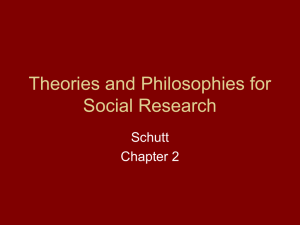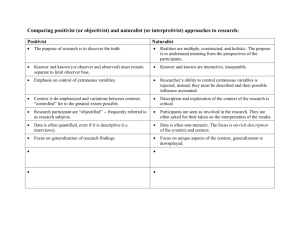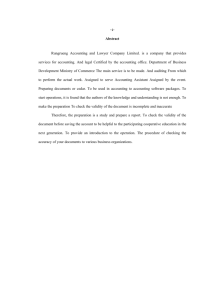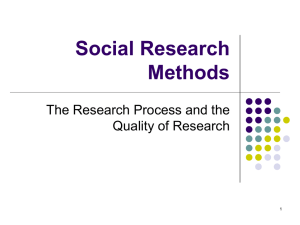Lessons Learned about Mixed Methods Research PhD Dissertations
advertisement
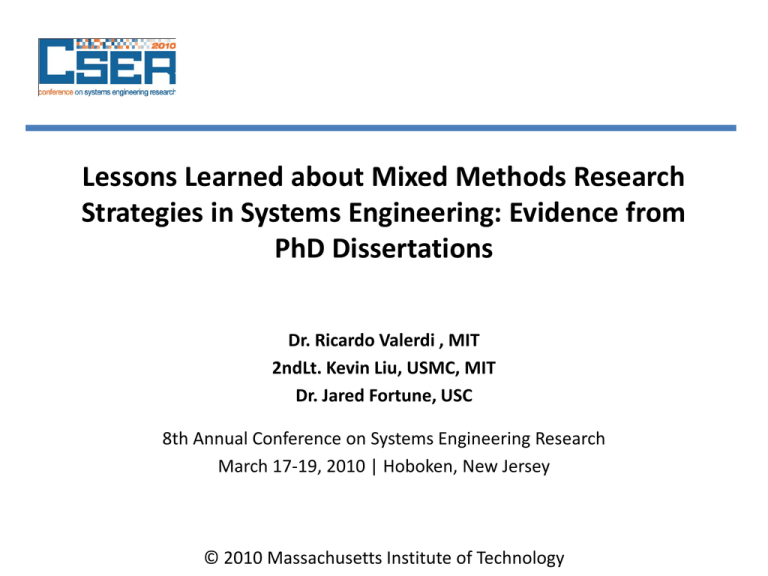
Lessons Learned about Mixed Methods Research Strategies in Systems Engineering: Evidence from PhD Dissertations Dr. Ricardo Valerdi , MIT 2ndLt. Kevin Liu, USMC, MIT Dr. Jared Fortune, USC 8th Annual Conference on Systems Engineering Research March 17-19, 2010 | Hoboken, New Jersey 1 © 2010 Massachusetts Institute of Technology Takeaway Systems engineering researchers should give more attention to methods and methodology… …both when planning their research and when presenting their findings. Presented to the Conference on Systems Engineering Research 2010 Page 2 Outline Which methods do Systems Engineering researchers choose? Data from PhD dissertations Positivist vs. Interpretivist Research Examples from recent research Observations for New Students Presented to the Conference on Systems Engineering Research 2010 Page 3 Student Perspective Methods Methodology “a defined process for the “overarching standpoint from which to view the problem and acquisition and analysis of data” (Brown 2009) potential routes to a solution” (Brown 2009) Which methods should you pick? Presented to the Conference on Systems Engineering Research 2010 Page 4 Literature – Research Methods Controlled Settings Laboratory Experiments Experimental Simulations Judgment Tasks Behavior Setting-Independent Field Experiments Natural Settings Sample Surveys Field Studies Formal Theory Runkel and McGrath (1972) Research on Human Behavior: A Systematic Guide Computer Simulations No Observation of Behavior Presented to the Conference on Systems Engineering Research 2010 Page 5 Data – Goals and Methods Do current Systems Engineering researchers apply mixed methods? Which methods do Systems Engineering researchers choose? Presented to the Conference on Systems Engineering Research 2010 Page 6 Data – PhD Dissertations USA TOTAL: 58 Norway Netherlands Germany Canada Presented to the Conference on Systems Engineering Research 2010 Page 7 Data – PhD Dissertations Field Studies Computer Simulations Sample Surveys 62% of students applied mixed methods Formal Theory Judgment Tasks Laboratory Experiments Field Experiments Experimental Simulations 0 5 10 15 20 25 30 35 n=58 Presented to the Conference on Systems Engineering Research 2010 Page 8 Discussion – Methodology •10 theses (17.2%) lacked clear logic explaining the research approach. •22 theses (38%) showed a logical process linking different methods together, but lacked a cohesive argument for how data were linked to research questions •26 theses (45%) documented a clear toplevel architecture n=58 Presented to the Conference on Systems Engineering Research 2010 Page 9 SE and Industry Academic Innovation Theory Systems Engineering Theories Empirical Generalizations Predictions (Hypotheses) Observations Real World Industry Innovation Presented to the Conference on Systems Engineering Research 2010 Page 10 Discussion – Interpretivist vs. Positivist Research Positivist Interpretivist Construct Validity Credibility Ask the right question Does the participant buy it? Internal validity Confirmability Cause and effect Do others agree? External validity Transferability Conclusions apply elsewhere Conclusions useful elsewhere Reliability Dependability Repeatable under change Repeatable Adapted from Klein and Myers 1999 and Guba and Lincoln 1994 Presented to the Conference on Systems Engineering Research 2010 Page 11 Discussion – Interpretivist vs. Positivist Research Positivist Interpretivist Construct Validity Credibility Ask the right question Does the participant buy it? Internal validity Confirmability Cause and effect Do others agree? External validity Transferability Conclusions apply elsewhere Conclusions useful elsewhere Reliability Dependability Repeatable under change Repeatable Adapted from Klein and Myers 1999 and Guba and Lincoln 1994 Presented to the Conference on Systems Engineering Research 2010 Page 12 Discussion – Interpretivist vs. Positivist Research Positivist Interpretivist Construct Validity Credibility Ask the right question Does the participant buy it? Internal validity Confirmability Cause and effect Do others agree? External validity Transferability Conclusions apply elsewhere Conclusions useful elsewhere Reliability Dependability Repeatable under change Repeatable Adapted from Klein and Myers 1999 and Guba and Lincoln 1994 Presented to the Conference on Systems Engineering Research 2010 Page 13 Discussion – Interpretivist vs. Positivist Research Positivist Interpretivist Construct Validity Credibility Ask the right question Does the participant buy it? Internal validity Confirmability Cause and effect Do others agree? External validity Transferability Conclusions apply elsewhere Conclusions useful elsewhere Reliability Dependability Repeatable under change Repeatable Adapted from Klein and Myers 1999 and Guba and Lincoln 1994 Presented to the Conference on Systems Engineering Research 2010 Page 14 Discussion – Interpretivist vs. Positivist Research Interpretivist Positivist 44 of 58 (76%) 3 of 58 (5%) 11 of 58 (19%) Both Presented to the Conference on Systems Engineering Research 2010 n=58 62% of students applied mixed methods Page 15 Experiences Presented to the Conference on Systems Engineering Research 2010 Page 16 Experiences Presented to the Conference on Systems Engineering Research 2010 Page 17 Observations for New Students Recommendation #1 Part of the topic identification process should include the consideration of possible research methods and methodologies that would be relevant to research goals. Recommendation #2 The topic of choice should address the needs of practitioners, and be achievable given the associated personnel, data, and time constraints. Recommendation #3 There should be sufficient flexibility in the definition of hypotheses to allow for changes given data availability, fidelity and quality. Presented to the Conference on Systems Engineering Research 2010 Page 18 Observations for New Students Recommendation #1 Part of the topic identification process should include the consideration of possible research techniques that would be relevant to research goals. Recommendation #2 The topic of choice should address the needs of practitioners, and be achievable given the associated personnel, data, and time constraints. Recommendation #3 There should be sufficient flexibility in the definition of hypotheses to allow for changes given data availability, fidelity and quality. Presented to the Conference on Systems Engineering Research 2010 Page 19 Observations for New Students Recommendation #1 Part of the topic identification process should include the consideration of possible research techniques that would be relevant to research goals. Recommendation #2 The topic of choice should address the needs of practitioners, and be achievable given the associated personnel, data, and time constraints. Recommendation #3 There should be sufficient flexibility in the definition of hypotheses to allow for changes given data availability, fidelity and quality. Presented to the Conference on Systems Engineering Research 2010 Page 20 Conclusion Systems engineering researchers should give more attention to methods and methodology… …both when planning their research and when presenting their findings. Presented to the Conference on Systems Engineering Research 2010 Page 21
